Amy Klobuchar Doesn’t Think We’re Doing Nearly Enough to Protect Voting Rights
Jessica Pels: Well, hello, Senator Klobuchar. Thank you so much for being with us today.
Amy Klobuchar: Thank you. Thanks, Jessica.
Jessica Pels: This series of interviews is designed to give our audience, which is a very large group, 81 million readers—it’s a huge voting block that’s expected to make up more than a third of the electorate next year—and we are interviewing every presidential candidate to give them insight into how each candidate will prioritize the issues that matter to young women. And our polling consistently shows that those issues are health care, climate change, and reproductive rights. So we’re excited to hear your plans for making impact on those fronts today. And I’ll just jump right in.
A new Cosmo poll found that 83 percent of our readers think a female president would handle issues that affect women differently than a male president would.
Amy Klobuchar: You must have smart readers. That’s what I think, yes.
Jessica Pels: We do. So I’m curious if you agree and what in particular you think you are uniquely suited to solve?
Amy Klobuchar: Well, I’m so glad your readers feel that way because when you look at the facts, like the women in the Senate that I work with, there’s actually been a study showing that we get more done, that we work across the aisle better, and that we’ve actually been able to have better relationships. Big surprise. And we actually are all friends and we get together for dinner. And of course we never talk about the male senators...no, we do. And nothing ever comes out of that room. And I think actually you’re starting to see more and more women in executive jobs, governors. There’s a new governor in Kansas who beat that Chris Kobach, who is such a problem from my perspective. And this woman Laura Kelly is the governor of Kansas. There’s a new woman governor in Michigan who ran on the slogan “Fix the damn roads.” So you’re just seeing more and more women in power. And so I think it’s really an important thing to focus on.
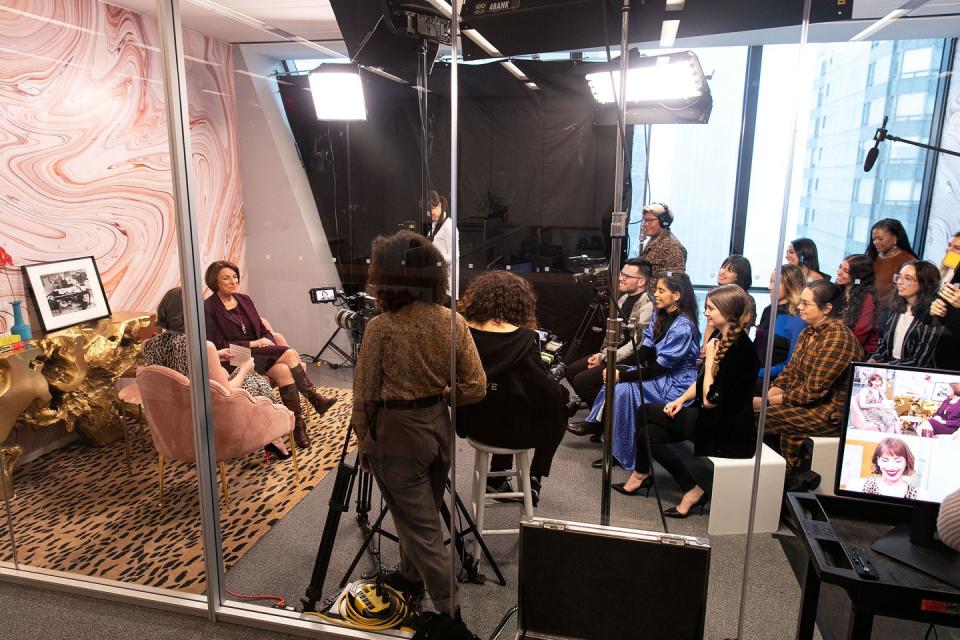
At the same time, I’ve made really clear that I’m running my campaign—yes, I would be the first woman president, but I don’t think that’s the reason to vote for me, actually. I think the reason is that I have people’s backs. That I’m going to get things done and that I cannot just win but win big. I want to have a big victory for our country so that we’re actually able to move on these issues that your readers care about. Climate change and health care, as you mentioned, and reproductive rights. And I would also add gun safety legislation because it is the young people of this country who are leading the way. We were going nowhere really on that issue until after Parkland, when those kids stood up in Florida and then other kids across the country and students and young people saw it and they thought, I can do that too. And they started to talk to their parents and their grandparents, including in hunting families like in my state. And people started to say, “Oh, maybe we can make a difference.”

I can’t, just like the young generation a generation ago brought us gay marriage, which was time, was long overdue. This is this generation’s moment for climate change and for reproductive rights and certainly for gun safety.
Jessica Pels: That’s interesting. So you feel, it seems, that there would almost be a bottom-up effect of Gen Z and millennials leading the charge on progressive policy. How would you work with millennials and Gen Z to make these things happen?
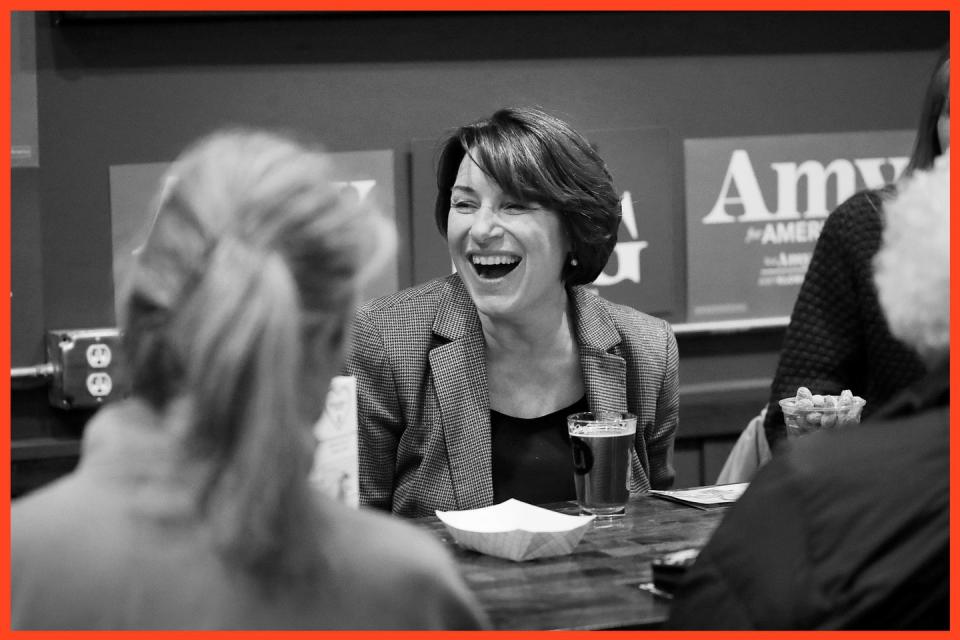
Amy Klobuchar: Well, the first thing I always like to do is tell people who aren’t in Gen Z or in the millennial generation that you don’t really understand this generation if you think they sleep in their parents’ basements. If they do, it’s because it is too hard for them to afford anything because of student loans. And that, in fact, your generation is the most diverse generation we’ve ever had. It is the one that cares the most about the world around us and that the people in this generation work incredibly hard. I know that because I have a 24-year-old daughter, and I also know it because I work with a bunch of young people, both on my campaign and in my official office. And I just think this is the time and that’s how I see it.

And I have found 137 things you can do without Congress as a president—that a president can do herself—that are legal. I just want to point out, they’ll be held up by the court. And that’s closing the boyfriend loophole on guns. That’s my bill. So that domestic abusers can’t go out and buy an AK-47. I woke up this morning to one of the saddest stories I ever heard of a mom whose ex-husband came and shot her and her two children, 8 and 11, in their front yard in my town. Those things are happening. And then he shot himself. These guns shouldn’t be in the hands of people like that. There’s so many things you can do without Congress. I love Congress. I’m going to work with them really well, but I think getting that jump-start to build trust in our democracy is going to be so key for our country.
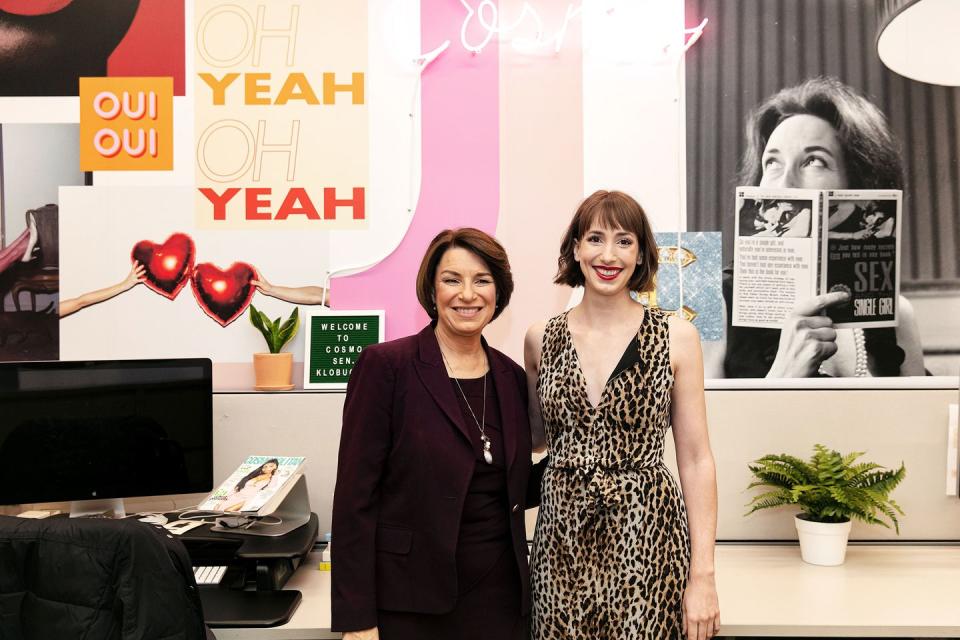
Jessica Pels: I liked your pronoun usage with president, that it was female.
Amy Klobuchar: You have to start doing that. I said this on the debate stage. I have always run my races...as I said, I’ve always gotten a lot of support from men, if you look back at the numbers—as well as women—but more men than a lot of other women candidates get. And one of the things I realized, though, running for this office is you have to dispel some of this because, and I said this at the debate in Atlanta, is that you don’t have to be the tallest person to be president. I hope not. I like to note James Madison was 5'4" like me. You do not have to be the loudest person. We already have that in the White House. You don’t have to be the skinniest person. But you have to be competent and there is so much hype around what a president should look like in people’s minds that we need to dispel to get them to the right place.
I think we are held to a different standard. And if that wasn’t true, we could play right now “name your favorite woman president.” But we can’t name one because we’ve never had one.
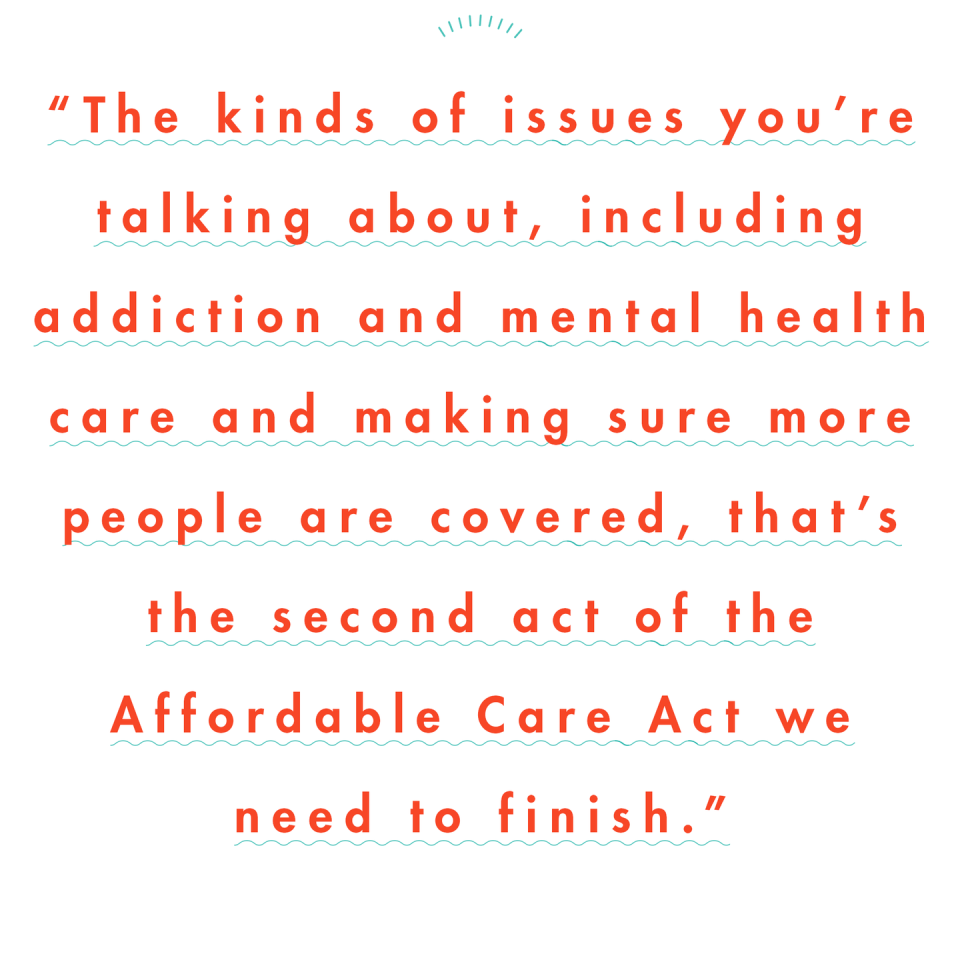
Jessica Pels: You touched on a ton of very important topics, one of which I want to zero in on here. Reproductive freedom is as close to a consensus issue as we have here at Cosmo—85 percent of our audience says it’s an American right. You have a long record of protecting women’s reproductive freedom in the Senate. But as a candidate, you haven’t yet laid out a particularly robust plan for how you would address this, like, say, Booker’s White House Office of Reproductive Freedom. Can you tell us what your plans are?
Amy Klobuchar: Oh, sure. This actually is a big priority of mine, and I have made it very clear. I think I’ve talked about it in the last two debates. Codifying Roe v. Wade, which a number of the other candidates share, is probably the number one thing we could do so that if a court starts to mess around with it, it is in law. I think that’s the most important. I think getting judges appointed immediately, starting from the beginning, that respect the law, which includes Roe v. Wade and other cases like that that guarantee freedom, is very important. I mentioned the domestic and international gag rules. That is a big part of what I would do as president so that people are able to go to clinics. One thing that’s so important right now is funding Planned Parenthood. This president has reversed that, and that’s something I could change immediately.

And the last thing I’d add is clinic safety. When I was the prosecutor, the DA for our biggest county in our state, we had a lot of issues with safety. And so I made that a priority back then. And that means making sure you’re putting the federal resources into prosecuting cases but also protecting women that go to clinics, when 1 in 5 women use Planned Parenthood some time in their life and it’s for things like contraception or for other health-care checks.
Jessica Pels: What are your policy thoughts on access to birth control?
Amy Klobuchar: I think birth control should be accessible. It’s part of the Affordable Care Act and we have to make sure that it’s accessible and affordable. What you’ve seen in the last few, last decade or so, especially during President Obama’s term, you saw the number of abortions go down and you saw the number of unwanted pregnancies go down. That’s a good thing. And what you want to have is abortion available, but you also want to make sure that people have contraception. So that would be a major part of what I would do as well.
And then there’s interesting work going on. Like, if a young person gets pregnant once and has a baby, there’s a lot of work—and this doesn’t come to your head right away—in making sure they have contraception so that doesn’t happen again and that they can raise their child or give their child up for adoption but that they have access to contraception. That’s been one of the ways that people have found it really helpful and not just discounting that group.

Jessica Pels: It’s interesting. We never really hear about that.
So I have asked every candidate who comes through these doors about climate change because all of our data shows that it is the single most important issue to this generation. And according to recent research, the situation is dire and getting more so by the day. Can you talk about why you’re supporting a more moderate approach to addressing climate change as opposed to a more aggressive one?
Amy Klobuchar: Yeah, I don’t think it’s more moderate. I think it’s pretty much in line with what Governor Inslee, who’s been such a leader on this nationally, the governor of Washington state, it’s pretty much his proposal as well as proposals that most of the other candidates have. I think Senator Sanders may have a little different proposal, but for the rest of us, it’s very similar. And it’s going to carbon neutral by 2050. I am on the Green New Deal. I’m one of the cosponsors. I see that goal as aspirational, but it’s something that if we develop the technology in 10 years, great. But certainly, we have to be there. All the climate scientists say this, by 2050, and there’s steps along the way, as well by 2030 and other places. So the question is how do you get there? You work with the rest of the world. You bring down the...you increase the gas mileage standards to bring down CO2.
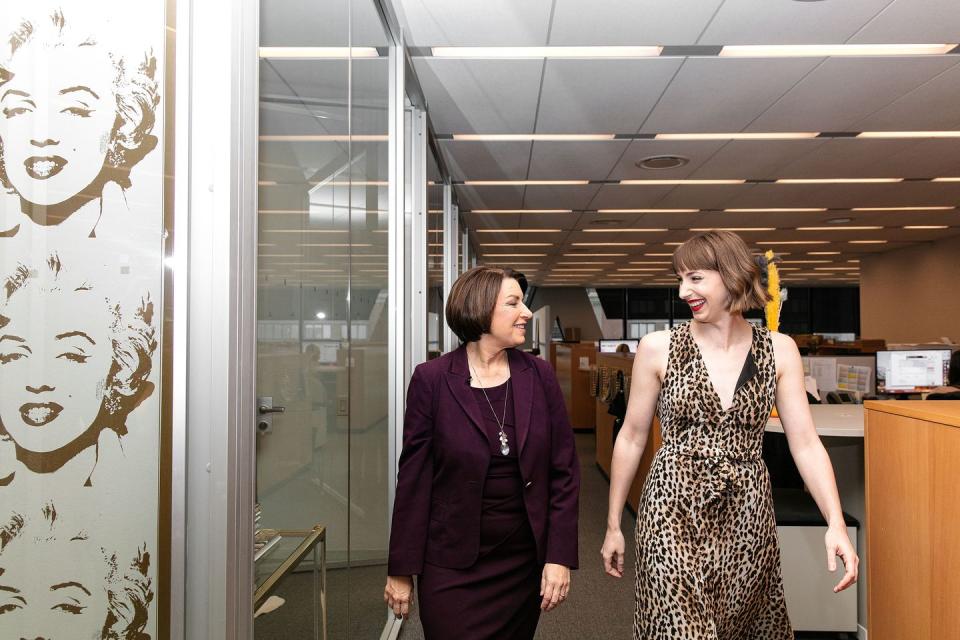
California right now is attempting to do that because Trump went backward on the Obama administration’s gas mileage standards. It’s absolutely outrageous. A number of the car companies wanted to do it. Ford wanted to do it. And then the Trump administration stopped them and threatened the companies who are trying to work with California with Justice Department antitrust violations. And so what I would do, of course, is stop all that, bring back those gas mileage standards, which save money and are better for our environment. And then introduce sweeping legislation for everything from energy efficiency to building codes to putting a price on carbon.
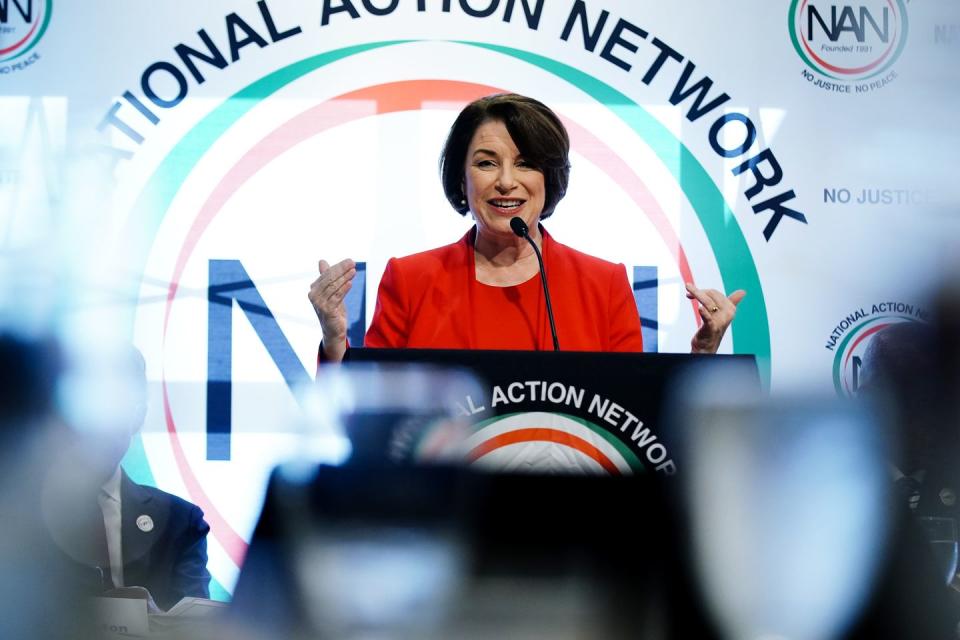
And one important thing to note for your readers that are in the middle of the country. So much focus is always on rising sea levels, as it should be, and what’s happening with hurricanes, as it should be. But there is bad stuff going on in the middle of the country. There’s flooding in places like Iowa, Missouri, Nebraska, just this last year. There are wildfires like you saw in California, yes, but also in states like Colorado and states like Arizona. If you have a candidate from the middle of the country that understands those issues from that perspective, it really helps to make it a priority and get the votes in.
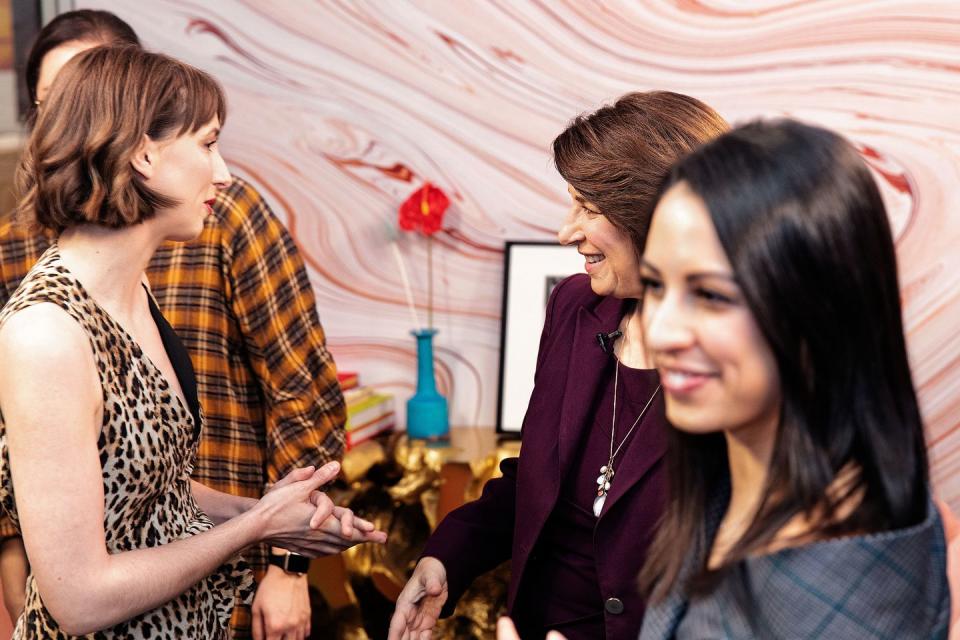
Jessica Pels: Part of your plan that you’ve laid out is to create a cabinet-level task force for election security, which is obviously not something that our current president has prioritized. And as a result, half of our audience, 50 percent of our readers say that they are worried about election interference in 2020. So what are your urgent priorities here?
Amy Klobuchar: Well, the first is doing everything we can to allow people to vote. It is...you cannot have a functioning democracy if you have people that are trying to shut people out from voting. You look at like in Georgia, what just happened in the last election, if they hadn’t purged all these names and they hadn’t withheld people who had actually registered because of hyphens in their names, Stacey Abrams would be governor right now of that state. And so my first priority is actually my bill that I lead to register every kid in the country when they turn 18. I figure if you can get a social security number, we can do this.
I would also get the bad money outside of politics that’s coming in. I think that it is out of there. I think it’s a result of a Supreme Court decision called Citizens United. I’d start a constitutional amendment to reverse that. I am not someone that comes from money. I know we have a bunch of billionaires now running in this race. You see the ads all the time. The richest person isn’t necessarily the best candidate. And I don’t think people look in the White House and say, “Oh, let me find someone richer.” I think they want to know who can lead the ticket and who can win.
And in my case, I’ve never come from money. My elections, I once set an all-time U.S. Senate record when I was running. I was having trouble raising money, so I called everyone in my life and I raised $17,000 from ex-boyfriends. That’s a true story. And I think it’s a good—and as my husband’s pointed out, it’s not an expanding base of donors for me—so it’s a good lesson for every one of your readers and people watching here is that you try to keep good relations with your exes. Because you never know.
Jessica Pels: Easier said than done.
Amy Klobuchar: You never know. But anyway, so, but that would be a Cosmo advice column I could write at another time. I used to read those when I was growing up, to make clear. Yes, I read the magazine quite a bit. So anyway, but the point is I didn’t come from money and so I think doing anything we can to even the playing field, otherwise you’re not going to have enough women in office. You’re not going to have enough people of color in office and so all that needs to change.

And then for security, I lead those bills to get backup paper ballots. In the 11 states that don’t have all backup paper ballots, you could have a hack from Russia or some other country or another criminal element and we wouldn’t even have a backup paper ballot. And those countries know exactly what counties don’t have them. And so I have tried to get this bill through. It’s a bipartisan bill with James Langford of Oklahoma and we were gut-punched by the Trump White House and Mitch McConnell. It was ready to go to the floor, there was going to be a vote in the committee, and they called the Republicans—I know they did, they told me and it’s been documented—and stopped the bill. You can see what they want. And so there again gets to my argument—we have to win big, we have to do everything we can to push the states, and then we also have to watch out for these fake ads we’re going to see all over social media and videos.
There was one image that was put out right before the Trump-Hillary election, which was the African American woman, and it went out to African American Facebook pages in swing districts and it said this, it said, looked like a fake Hillary thing and it said, “You don’t have to go wait in line to vote. You can text your vote.” And it had a fake number, like 86153. To me, that’s a crime. That’s voter suppression. They’re trying to make it so people can’t vote. So that’s what people are going to have to be watching out for and why I’m leading that bill to make the social media companies have the advertising to say “prepared and paid for” and what the ads are. And also, again, the actual hacking into equipment, we need backup paper ballots.
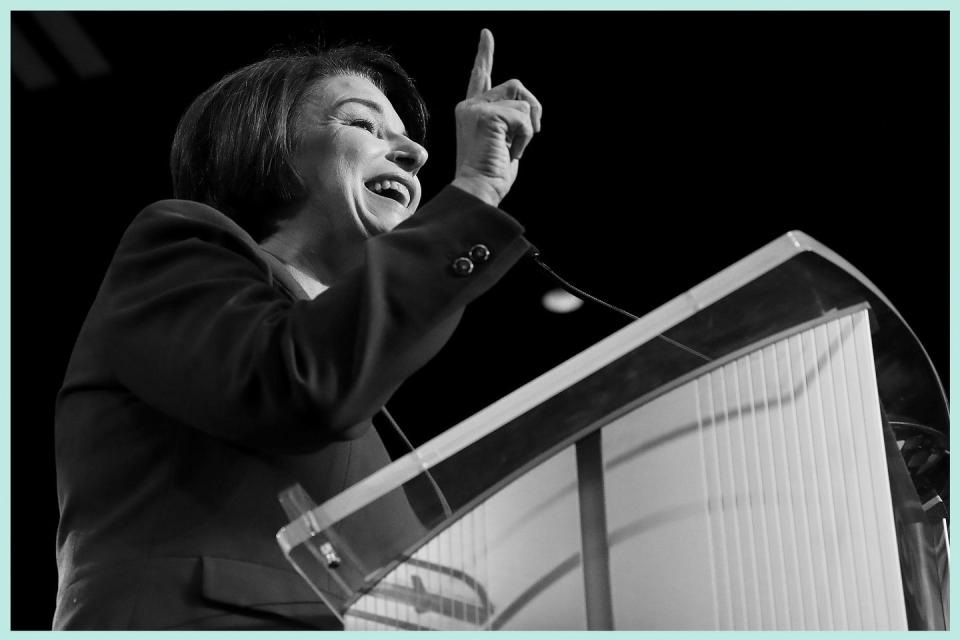
Jessica Pels: That’s great. So I want to talk for a moment about being a woman in leadership. I’m a woman in leadership. You’re looking at a room of women in leadership positions.
Amy Klobuchar: Yes, and one guy that broke the glass ceiling.
Jessica Pels: And one guy. Hi, John. And we know how frustratingly delicate it can be to navigate as a female leader. So there were reports earlier this year that you have a high staff turnover rate or that you have treated certain employees harshly. I want to know if those reports caused you to reassess your management style or how you think your management style fits into the larger context of what’s happening in the world.
Amy Klobuchar: Yeah, well, I first want to say I’m so proud of our staff. Together, we have passed over a hundred bills where I’m the lead Democrat, and you don’t do that without great staff. I have one of the highest records of passing bills and that’s because we have great staff and I’m proud of them. And our campaign staff, we have, since the moment of that blizzard announcement, we have basically hung together and have a really great team. And I think anyone would tell you that in Iowa and New Hampshire and we’re building now in South Carolina and Nevada, in the early states.

And I think you can always do better. Yes, you learn from your mistakes and you can always do better. And I think that one of the things that we’ve found, being a woman leader, and I think some of the other candidates know this as well, you always walk this line and I think you want someone tough to take on Donald Trump. And that is true because he’s not easy, and you have to have someone that’s able to take on issues at a debate, which I’ve proven that I can do, and someone who’s going to stand in their principles. But in the end, we have to remember this is all about improving people’s lives and getting things done. And that’s what I’ve always been focused on. I have high standards for myself, for the people that work with me, but most importantly, I have high standards for our country.
Jessica Pels: So I’m going to turn it over to my editors to ask a couple of quick questions for you. We’ll start with Alexandra.
Amy Klobuchar: Okay. Very good. Hi, Alexandra.
Alexandra Whittaker, senior news editor: You’ve talked about protecting the Dreamers, but you’ve also said we need enhanced security at the Southern border. Can you explain how you would increase security while also preventing the humanitarian tragedies like we’ve seen this year?
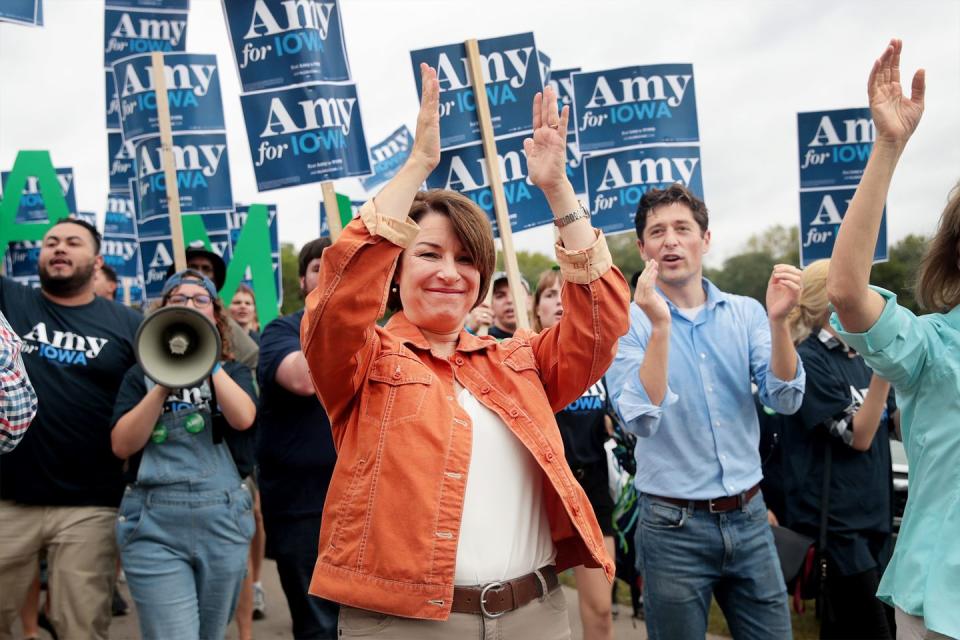
Amy Klobuchar: Sure. Well, my first focus is on making sure we reverse these policies of not just the, as I mentioned, separating the moms and dads and their kids—that’s so wrong. I’ve been down to the border, I’ve seen it—but also ending these private detention centers. I visited one in Florida called Homestead, or at least, they wouldn’t let me in, but I was able to look over on the stepladder into the yard. And when I talk about security at the border, I think there’s general agreement. We do have security personnel at the border and we want to make sure, but it’s got to be smart. I’m opposed to this wall the president wants to build and have voted against it. And the only wall that I am for is for building a blue wall of votes and Democratic votes around those states of Wisconsin and Michigan and Pennsylvania, Ohio and Iowa, and making Donald Trump pay for that.
I think the bigger issue with immigration reform, what we need is comprehensive immigration reform. And what that means to me, more importantly than anything, is focusing on the benefits of immigrants. The way he has done this, every single day, when he talks about it the way he does, it’s to divide people and to create a wedge, and we need to completely overhaul how we talk about it because most Americans get it. We need immigrant workers. Our whole country is built on immigrants, with the exception of our Native American community, who were here first, but everyone else stands on the shoulders of immigrants. And you look at what we’ve got going here. We need workers right now in our hospitals and our nursing homes, in our fields, in our factories, starting small businesses. Seventy of our Fortune 500 companies are headed up by people who were born in other countries. Twenty-five percent of our U.S. Nobel Laureates were born in other countries.
And that’s why this idea of giving a path to citizenship of people who are willing to abide by the laws and are willing to, who are here right now, there’s, like, 12 million of them, and are willing to learn English and are willing to work. That is what we should be doing. And you do that, we passed a bill like that in the Senate with bipartisan support. It had the support of migrant workers, it had the support of the AFL-CIO and the Chamber of Commerce. And then it just ended up in John Boehner’s freezer and it just sat there next to the frozen peas and never got done. And so now we have, if I win this and we win big and we have a Congress that is willing to get this done, it’s one of my top priorities with climate change and with some of the economic issues, like taking on the health-care premiums and the pharmaceutical companies, that we can get done in the first year.

Alexandra Whittaker: Thank you.
Jessica Pels: Thanks, Alexandra. Andrea?
Amy Klobuchar: Hi there.
Andrea Stanley, features director: One topic that we’ve been reporting on recently at Cosmo is rehab, and I know America’s addiction crisis is important to you as well. When my brother needed treatment for his heroin addiction, his private insurance company only paid for a few days of treatment and then abruptly cut off his coverage. If you don’t support Medicare for All, how do you plan to make sure that private insurance companies offer better and humane treatment for addiction when it seems that they have no interest in doing so?
Amy Klobuchar: Very good question and I’m sorry this happened to your family. I think you know you’re not alone. One out of 2 Americans have some kind of addiction in their family. For me, it’s personal. My dad struggled with alcoholism my whole life growing up. He had two DWIs when I was in middle school, and then by the time I got married, actually, he got his third, and by then, the laws had changed and they gave him a choice. They said, “Treatment or jail.” And he chose treatment. And in his mind, in his words, he was “pursued by grace” and it changed his life. And he still has an AA group that visits him in the assisted living where he lives now. He’s 91, and as he said recently, “It’s hard to get a drink around here anyway.” But that changed his life. And I think everyone has that same right to be pursued by grace.
So again, these ideas for me are not just with my head, my heart. I’ve seen the horror of the opioid epidemic, but I’ve also seen the horror of what’s still going on with crack cocaine and meth and some of the other drugs that actually plague our inner cities more than opioids do, even though there’s still an opioid problem. So my solution is, first of all, putting $100 billion into treatment. I’d get the money from those pharma companies that got people hooked, but I’d use it for all kinds of treatment, including mental health treatment, which has long been neglected, when 1 in 5 Americans struggle with mental health sometime in their life. I would use also some other closing hedge fund loophole and some other things to pay for it, but I clearly show how I’ll pay for this.
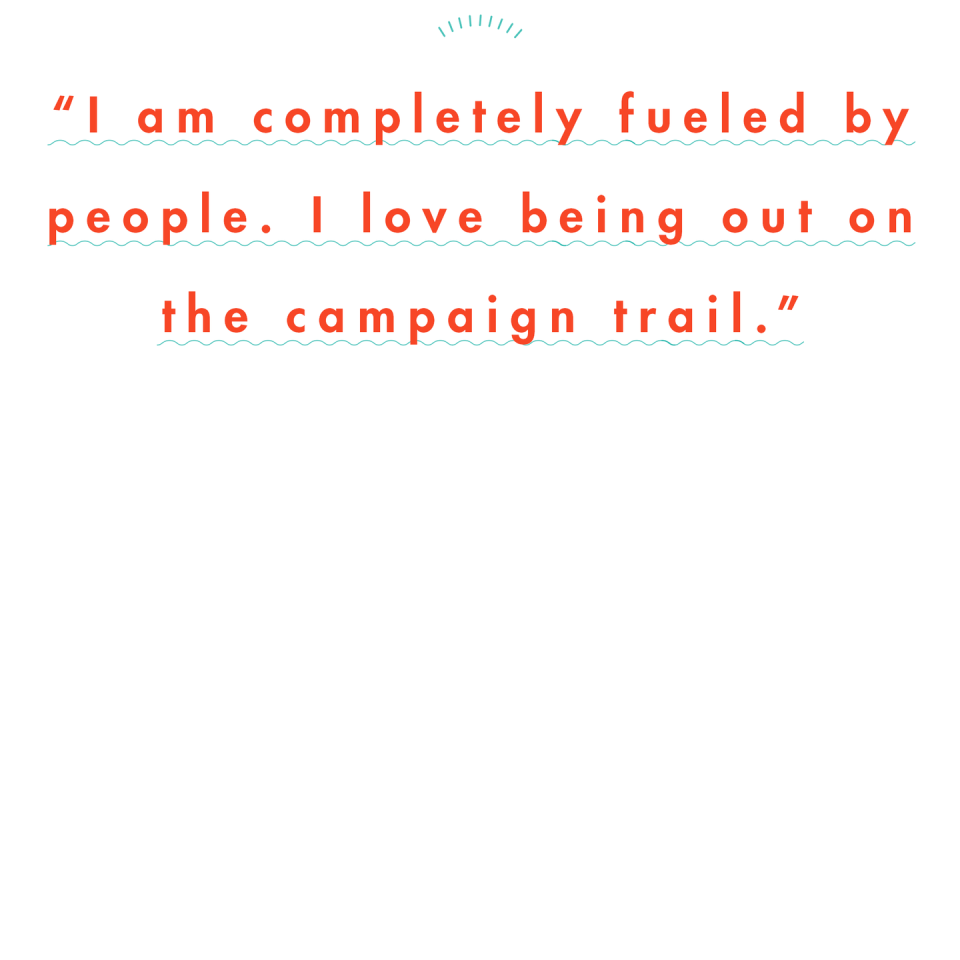
As far as insurance companies, I have been taking this on for a while. First of all, with mental health parity, and I actually passed a bill, which I think would be actually pretty interesting to a lot of your readers and viewers, because the highest rate of mental health mortality for women is actually eating disorders. And so I joined forces, I took a bill that didn’t go anywhere for, like, 20 years, to cover residential treatment for eating disorders and I got all the women senators behind it. I got three with me leading it and we passed it. And so that meant that insurance companies had to cover that kind of in-house treatment. And that is the same kind of philosophy I’d use because we have to make sure that they are held accountable.
The other thing I would do is to have a nonprofit public option, which will cover more people and bring the prices down. It’s what Barack Obama wanted to do from the beginning and what I wanted to get in there when I was working on the Affordable Care Act with the other senators. And so I have to get that done. We have to get more pharma covered, which can be helpful sometimes for people getting over addiction depending on what the prescription drug is, and take that on. I’m really excited to work on this. I feel like the Affordable Care Act, which, by the way, is now 10 points more popular than Donald Trump, was a beginning and not an end. And so that’s why I think Barack Obama doesn’t mind calling it Obamacare because it’s quite popular, but it was a beginning and not an end. So the kind of issues you’re talking about, including addiction and mental health care and making sure more people are covered, that’s the second act of the Affordable Care Act that we need to finish. I never said that “second act” before. That was pretty good. Okay.
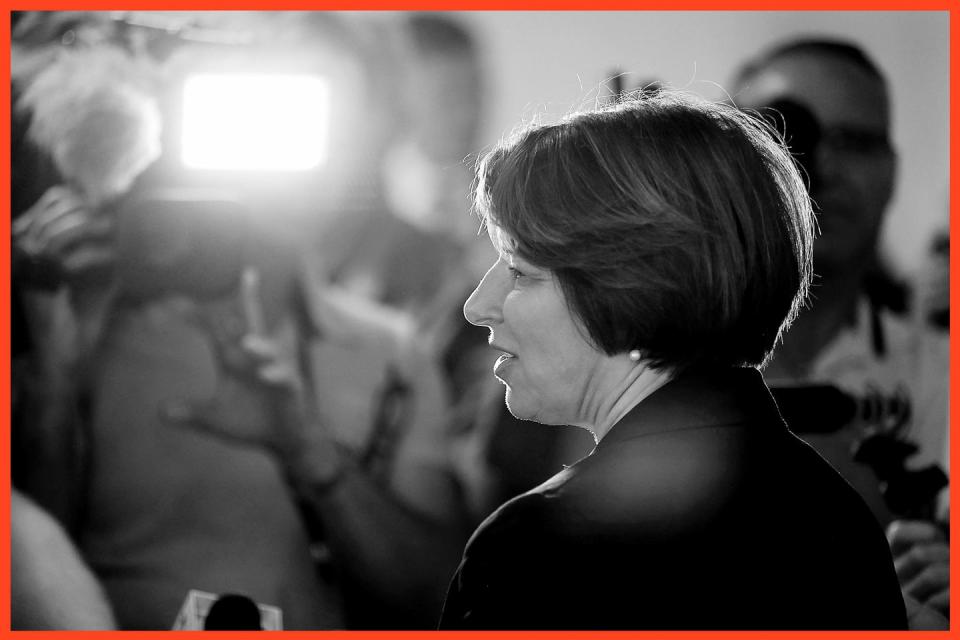
Jessica Pels: Love it. Okay, one more question from Rosa.
Rosa Heyman, deputy editor: So you’ve said that “we’re just being used” by tech companies that sell our online data without us knowing about it, and you’ve even floated the idea of a “data tax” that would return some of that money to consumers. So I’m curious your stance on the federal government’s role in protecting our data.
Amy Klobuchar: Sure. Well, we just introduced a big bill on this and I suggest you might want to look at. It just happened last week, actually. It was a combination of things that I had done and Brian Schatz, the senator from Hawaii, and led by Senator Cantwell, Maria Cantwell of Washington state, where they just have a little bit of tax. So, and she used to be in tech, so she knows about this. We have tried unsuccessfully to work with Republicans to get a privacy bill going. I find it really frustrating because of the fact that this is an area which is ripe for getting something done. They lobbied against it for a long time.
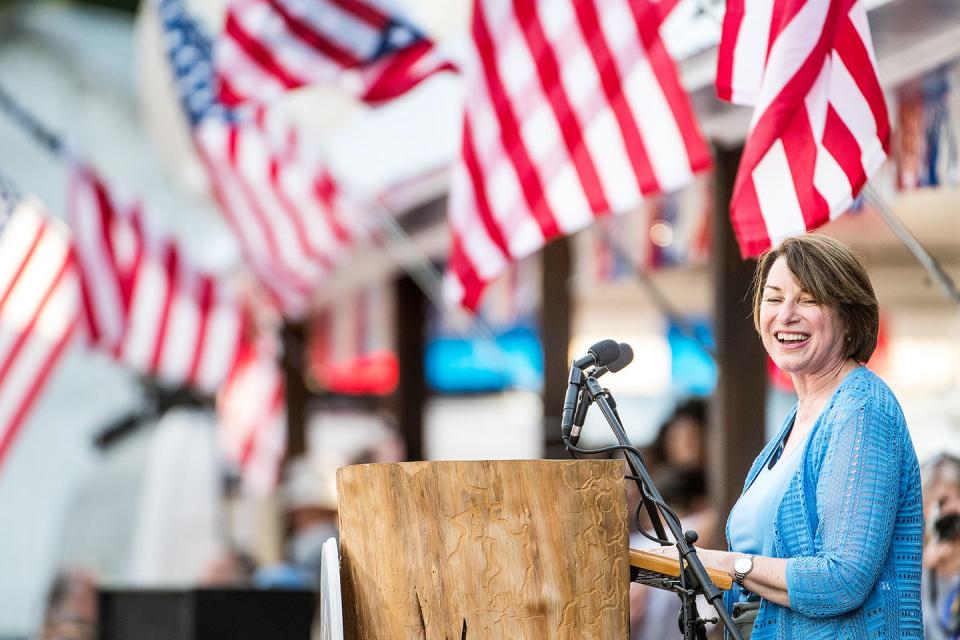
One, you need to make it easier to know what your rights are. Two, you should be able to—and there’s two ways you can do it, opt in, opt out—but you should be able to protect your information and have it very clear. There should be notification of breaches so people know what went wrong.
There is just so much more that we have to do to protect privacy. Literally nothing has happened. We’ve had this huge tech revolution and nothing’s happened. I have bills to actually protect your health data because everyone’s using Fitbits and other things like that. And I got...Lisa Murkowski and I did that together, the Republican senator from Alaska, who, as you know, was the Republican that voted against Justice Kavanaugh, I would like to point out. She is a friend and so we introduced a bill together on that front. Then I have another bipartisan bill on privacy. So I believe as president, I should be able to get this done.
Also, we’ve got to look at our antitrust laws for when you have a consolidation, like we’re starting to see, and it seems like every new idea gets bought up by one of those companies. That’s a problem because then you have less and less start-ups. We’re experiencing what’s called a “start-up slump” right now in our country. We’re down 30 percent over the last few decades.
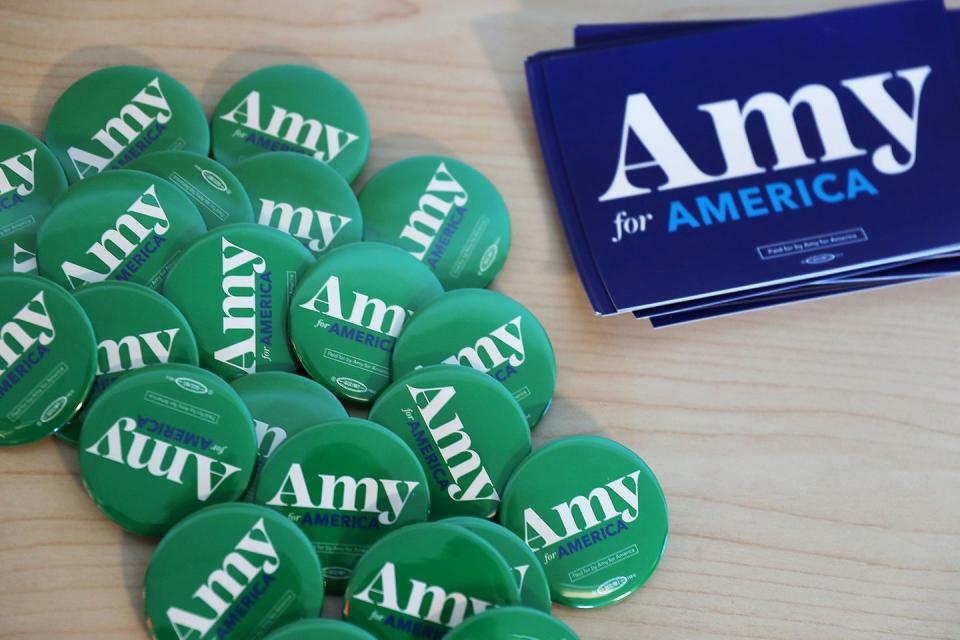
Then also, I just mentioned the political ads. I think holding them accountable on that. And these are great companies. Really smart people work there. We’re glad we’ve had these companies and we have them. But that doesn’t mean that they don’t have to follow the law and that they’re immune from this. They cannot pretend that they’re not companies. They’re not just little hubs that we share information on. They make money off that information.
So we should have consumer rights in place to protect consumers, and that information should belong to consumers. That’s the bill that Lisa and I have. Makes clear that that information, that health information, is your information.
Jessica Pels: Thank you, Rosa. Okay, so now it’s time for the best part.
Amy Klobuchar: Yes. I don’t know what that is.
Jessica Pels: It’s a rapid-fire round.
Amy Klobuchar: Ooh, a rapid-fire round. Okay, good.
Jessica Pels: Are you ready?
Amy Klobuchar: Yeah, I’m going to get a drink of water first.
Jessica Pels: Yes. Okay. What was the funniest moment at your Thanksgiving this year?
Amy Klobuchar: Oh, uh-oh. The funniest moment, we actually were in Iowa and we had...my family was there and then 41 of our staff, which was so cool. This woman who had a big house hosted us, and I had to come in with this yam casserole that I always make.
So we said, “You can just take pictures of that,” to the media. I’m sitting there and then they had me put all this stuff on top of it to put it in the oven. I was this close—I thought I was going to drop the whole thing on national TV. I’m, like, I’m not that great a cook, honestly.
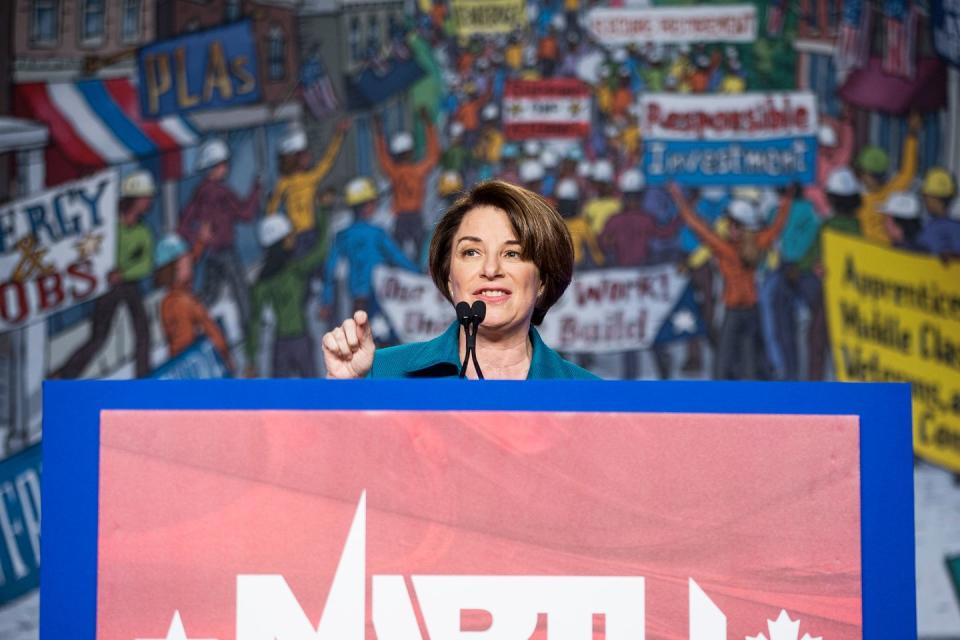
And when they said, “Well, did you make this whole thing yourself?” I go, “No. My state director made half of it and then I made the topping.” Like, I’m not going to lie about this, alright? I don’t really have an oven in the hotel room.
So anyway, then I thought, If I drop this, that will be pathetic. But I didn’t. We made it through. So it was fun and it was great to have our family there too.
Jessica Pels: A Thanksgiving miracle. So what is your holiday shopping style? Do you buy things in advance? Are you, like, a last-minute Amazon Primer?
Amy Klobuchar: Well, now I can’t tell everyone what I’m buying them. I did this once to my husband. A reporter asked me in the hallway, like a decade ago, “What are you getting your husband for Christmas?”
And I thought, Oh, it’ll never show up anywhere. I go, “Well, I’m getting him one of those GPS”—this is the early days of GPS. And I said, “We always get into arguments about directions because he won’t look at a map and he won’t call anyone.” And I said, “I figured a soothing woman’s voice on this GPS thing would be good for him.” And it ended up in the Washington Post, all over the country. He was so embarrassed and mad at me that he didn’t install it for six months. And then he did it.
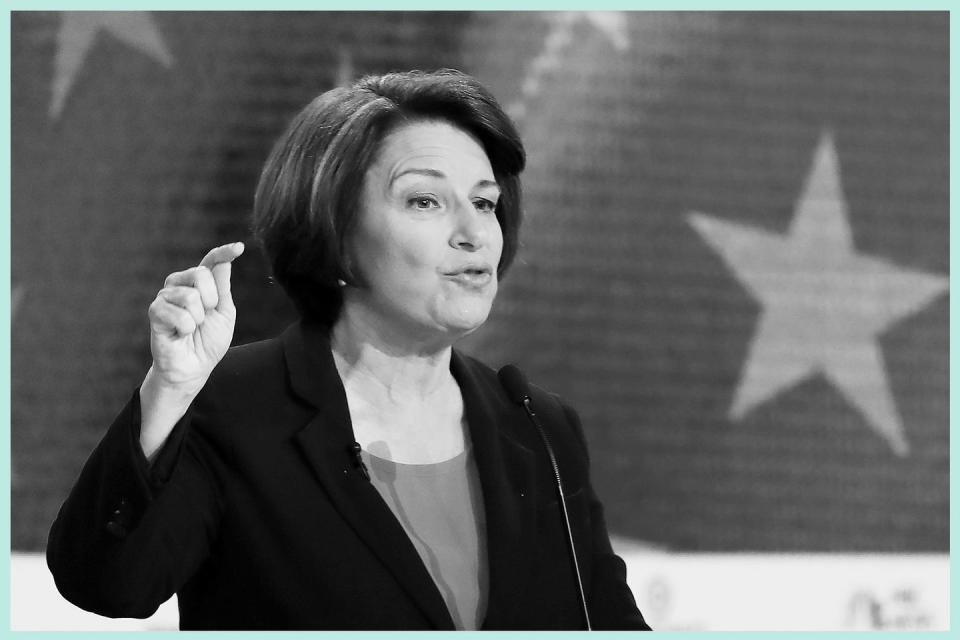
Jessica Pels: I like that you got him the GPS anyway.
Amy Klobuchar: I did. Yes.
Jessica Pels: So which Harry Potter house would you be in?
Amy Klobuchar: Oh, I don’t know. You’re going to have to tell me that one. I have not read…give me my choices here.
So here’s my truth about Harry Potter. I have read a number of the books, but I first read the books when I was reading to my daughter and she was only 6. I was a working mom and I was really tired and I kept falling asleep. She would get really mad and that’s how she learned to read, because I would fall asleep.
So, the things I remember is “kiddish,” right? I remember that.
Jessica Pels: Quidditch, right? Quidditch? Yeah.
Amy Klobuchar: I remember she was super embarrassed ’cause I pronounced that Her—Hermione? Hermione’s name wrong. There was a read-athon in the local library and I did that, I said it wrong and it ended up in the newspaper and she said, “I am so embarrassed. I cannot believe you’re my mom.”
And so, no surprise, I don’t remember the houses.
Jessica Pels: I think we should assign you one. What do you guys think?
Amy Klobuchar: Okay, what do you guys think?
Jessica Pels: Hufflepuff or Gryffindor?
Amy Klobuchar: Gryffindor, I remember that.
Jessica Pels: Gryffindor’s the best one, we’ll just go with that.
Amy Klobuchar: I remember a lot of this stuff.
Jessica Pels: What is the last thing you lost?
Amy Klobuchar: Another good story. So I didn’t really lose it because I found it, but I was going to a town hall in Milwaukee. I got on the airplane. I couldn’t bring my luggage on with me and I was really worried I’d lose my outfit. I had to do it the next day and I thought, Oh no, what if they lose my luggage? like you always think.
So I open it up and I took everything out of it that I needed, and I got on the airplane. They took the luggage, I get on the airplane. It’s all in my arms. I didn’t have time, I just had my purse. We just had a vote in Washington. I’m flying to Milwaukee. I get on the plane and I stuff the suit coat and the pants up at the top, and I sit down.
And all of a sudden, this guy behind me goes, “Hey, hey, hey, Senator, Amy?” And I’m like, “Yeah?” He goes, “You dropped something there in the aisle and you might want to pick it up.” It’s a bright-colored pair of underwear. It’s sitting there, and I literally—when you think of how dumb it was—I could have bought underwear, but I remember thinking, I better have everything that I need in case something goes wrong.
So I picked it up, put it up there. I, to this day, don’t know that guy’s name, but I want to thank him. Like, what a kind guy. No one else had said a word, but that guy did.
Jessica Pels: He’ll see this, I’m sure he’ll see this. Okay, so you may be aware that you are a double Gemini.
Amy Klobuchar: Yes.
Jessica Pels: It’s your Sun and Moon signs, they’re both Gemini, which means that—
Amy Klobuchar: I just knew it was my sign. I didn’t know I was double.
Jessica Pels: Also your Moon sign! So it means that you’re fueled by communication and banter.
Amy Klobuchar: Surprise!
Jessica Pels: Our astrologer guessed that that means you really love the campaign trail.
Amy Klobuchar: Yes.
Jessica Pels: Is that true?
Amy Klobuchar: I do. And first of all, I did used to read the astrology predictions in Cosmo, when I was—I would just like to point out—when maybe I was a little younger, like your reader. The second thing is that, yes, I like to, one, do two things at once, which is kind of a Gemini thing, like to do a lot of things.
But I am completely fueled by people. I love being out on the campaign trail. And by the way, you are such a better president or senator or whoever you are if you actually like what you’re doing. And people can tell.
Actually, some of our best presidents have been able to get out there and relate to people, not just on the campaign trail but when they’re president. I think if you don’t have that, it’s really hard to do your job. You have to empathize with people, you have to be able to understand them, and you have to enjoy being out there. Because if you don’t, why do it?
Jessica Pels: So your daughter is 24. She’s smack-dab in our demographic. What do you do now that embarrasses her?
Amy Klobuchar: Oh, bad jokes. She doesn’t like—yeah, some of the mom jokes. She likes some of my jokes. She herself has done some stand-up and is quite hilarious, including when she makes fun of me.
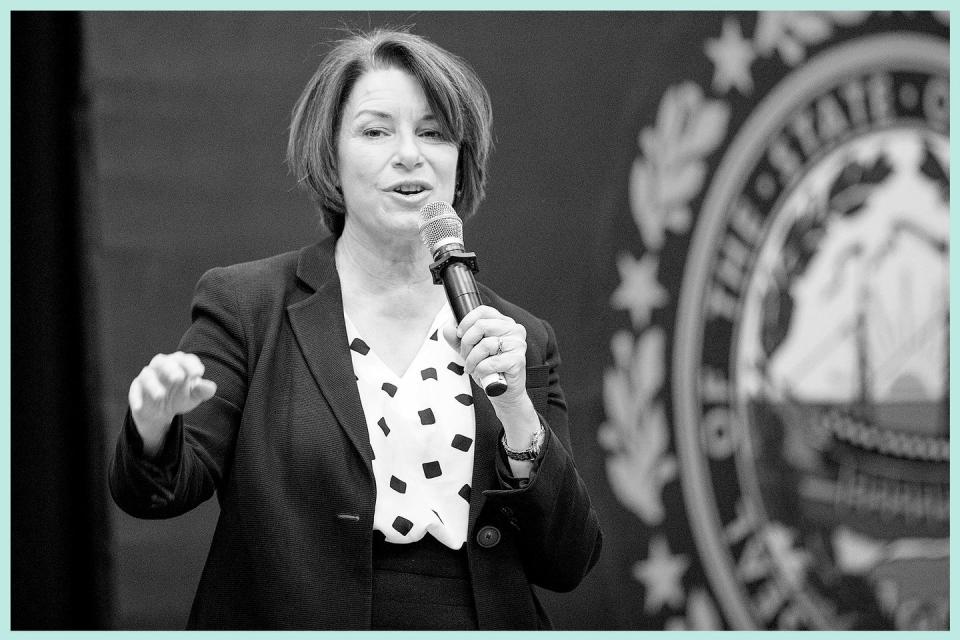
Jessica Pels: You don’t mind?
Amy Klobuchar: But there have been some things where she said, “Did you really bring that up?” At one of the debates, and she didn’t mind this as much, but I said, “Don’t say what Russia did was ‘meddling.’ What they did was an attack. It’s like a modern-day version of a missile.” I said, “Because meddling is what I do on a Saturday night when I call my daughter to ask her what she’s doing. That is meddling.”
One of the funny tips I give to other moms is when I would text her and she wouldn’t text back for a while, I started doing things like saying, “I’m on a plane and the doors are closing and I won’t have service.” And that made her respond or respond to a call because she knew that I wouldn’t talk that long or text that long. That was my one tip. Yeah. So if your mom does that, beware.
Jessica Pels: Smart. Now we know.
Amy Klobuchar: And then another thing I did once is that I called her from Air Force One when she wasn’t calling me. She thought the president was on the plane. That was when Obama was president. But he wasn’t going to talk to her, but I pretended that that would happen. So that is really an extreme technique that I wouldn’t suggest for people.
But anyway, she’s the best and she really likes being out there with me. We have a lot of fun together. She’s always had this really high EQ for politics. We’ll be in a parade route and my husband will be just up and talking to people and she’ll go, “Mom, don’t go over to that side.” I go, “Why?” She goes, “Someone has a sign that says ‘Congress sucks.’ Maybe go the other way.”
And she just does—really, I love her very much. We have very…again, if your family is not into doing this, it makes it really hard to because then you’d never see them.
Jessica Pels: Okay. And now, finally, our famous question.
Amy Klobuchar: Okay.
Jessica Pels: What is your skincare routine?
Amy Klobuchar: Oh my goodness. Okay. Well, I moisturize, moisturize, moisturize. I am from the middle of the country where there is a lot of snow, so I know that. I maybe heard that one of the candidates was not into—maybe I heard that—into moisturizing, so I thought I’d lead with that. I mean, not like I’m competitive or anything like that. And then also having, which none of the male candidates can say, having a lip color that’s moisturizer is a really good thing.

I don’t...I use all kinds of different products and I’m not going to do product placement but, well, I can, I guess. Let’s see, what have I used? I mean, I have not, like, one product. I use that Smashbox type sometimes. I’ve used, of course, Clinique, going way back because they give you all those free things.
Jessica Pels: Yes, the gifts!
Amy Klobuchar: And then I’ve used Maybelline, Revlon. So over time, I mean, one of the things, so I have sympathy for when Hillary, of course, was running and there was all this emphasis on that. It is. You have to think more about how you look when you’re doing this because a lot of people are really critical of it. And so that’s a more serious side of this thing. But you know, you do.
By the way, on that front, I was, maybe I’ll just end with this, not that I don’t want to end with skincare, but when I think about how I started on this journey, it’s actually related to my daughter. That election night when Hillary Clinton lost, which was such a big surprise for those of us that had thought she was going to win, my daughter was actually here in New York because she was in college then, at her party.
She texted me herself and the text said, “What should we do now?” And I had just been out speaking at things and I had just gotten home. It’s, “What should we do now?” And I thought, I forgot she’s at the party. I wrote back this long mom guilt text. And it said, “The subways are still running. You’re staying at our friends. You and your roommate need to leave. This isn’t going well and you have class tomorrow.” That’s what I wrote. And she wrote back, “Mom, I mean our country.” And that was the moment when I started to cry, because I thought, This kid thought she was going to have her first woman president.
But it is the question I still ask myself every day. I think a lot of people do. When Donald Trump does this mean-spirited stuff and goes after people of color and goes after immigrants. Every day, “What should we do now?”
And if you answer it not by putting the blanket over your head, but if you answer it with action, then we win. If you answer it not with the shrug of your shoulders or say, “I can’t deal with this anymore,” but instead you go out there and you volunteer, either for a charity or you work on a campaign or you help anyone or you run for office yourself—that’s how you win.
Jessica Pels: It’s a perfect way to end. Thank you so much for being here with us today.
Amy Klobuchar: All right. Thank you. Appreciate it.
Jessica Pels: Thank you.
Amy Klobuchar: Thank you.

You Might Also Like
